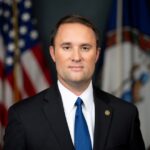
by Steve Haner
Attorney General Jason Miyares (R) was partially successful in his efforts to challenge much of the secrecy shielding key data in Dominion Energy Virginia’s application to build its planned offshore wind facility, with some useful precedents set for the future.
Just before the hearings on the application began last week, a State Corporation Commission hearing examiner accepted the Attorney General’s office’s motion in part and rejected it in part. As a result, several portions of the SCC staff testimony have been filed again with dozens of previously redacted sections now open.
Virginia law designates the Attorney General as Consumer Counsel, charged with representing the interests of consumers, accomplished by a Consumer Counsel section in the AG’s office. Senior Assistant Attorney General Meade Browder led this effort to bring more data into the sunlight.
Pleas to Miyares’ predecessor to act were ignored. Miyares, who took office in January, also recently pushed back on secrecy in an application from the other major electric utility, Appalachian Power Company. Perhaps pushing for transparency will become a regular part of the process, changing the insider culture of that courtroom and its cast of regular players.
In conceding the point in this case, Dominion proposed, and the hearing examiner accepted, two broad categories where secrecy could continue: information from confidential internal presentations to the company’s board of directors, and information about individual third-party bids, contracts and prices.
Despite the apparent retreat, Dominion had the major role in deciding which portions of the testimony to reopen, even going so far as to create a table of unnecessarily redacted portions by page and line number (see page 5 of its brief). In several other cases, however, information remains covered up simply because the motion from the Attorney General did not specify its challenge by page and line number.
That is part of the precedent the ruling seems to set. The items withheld may need to be challenged with greater specificity. It was also the case that the motion was filed very late in the process, months after the initial assertions of secrecy back in 2021. The motion arose as all the parties were busy preparing for the hearings and Dominion promised in a footnote:
In the future, the Company is open to Consumer Counsel reaching out to the Company informally, as Staff and other parties have done, to discuss concerns it may have with confidentiality markings prior to filing a Motion with the Commission. The Company commits to working in good faith with Consumer Counsel, Staff, or any party to work out any disputes of this sort prior to bringing motions to the Commission.
All the parties to the case, including representatives of non-government environmental groups and business groups, do have access to all this information. They sign non-disclosure pledges. But the general public is not a party to the case or the non-disclosure agreements, nor are media representatives. Why would a reporter want to sign an NDA?
The Attorney General did not challenge any of the company’s original designations of confidentiality from the beginning. He focused on later testimony from the SCC staff, which sought to maintain that secrecy in their own analysis and testimony. The result was documents riddled with exemptions.
Here are some examples of statements that are no longer redacted in the key testimony of Katya Kuleshova of the Division of Public Utility Regulation, who wrote about the costs and risks of the $10 billion project. Her refreshed testimony is in two parts (here and here.)
- According to the Company, $7.6 billion in competitively bid contracts’ costs constitute 86% of the approximately $8.9 billion of total Project costs, excluding interconnection costs. (Page 7)
- The Project’s LCOE (levelized cost of energy) is most sensitive to capacity factor and potential capital expenditure (“CAPEX”) overruns. (Page 8)
- The CVOW Commercial Project is expected to generate more energy during the shoulder months of lower energy prices and less energy during the months of higher energy prices in summer. Therefore, winter is the only season in which higher expected energy production of the CVOW Commercial Project coincides with higher energy prices.
- The Moody’s report suggests the following key protective provisions in construction contracts: Fixed prices, guaranteed completion dates, minimum performance thresholds, such as capacity or power curve, extended equipment warranties, contractual enhancements for serial defects, and liquidated damage provisions for nonperformance or delays.
Several tables and charts outlining how various construction or operational problems would impact the cost of the project to consumers are also now visible, having been blacked out before.
Much of importance remains off the record, hidden from the public, and it is not just board presentations or data about individual vendor bids. In the future, if the hearing officer’s ruling is precedent, the challenge to confidentiality should be made early on, when the utility cannot plead that it lacks time to respond.
No formal news media organization objected to the secrecy or asked the SCC to review the utility’s assertions that it needed the data hidden. Under the SCC rules, only the parties who sign the NDA can do that, and since they have the data for their own use, it has seldom happened.
This was first published this morning by the Thomas Jefferson Institute for Public Policy.

Leave a Reply
You must be logged in to post a comment.